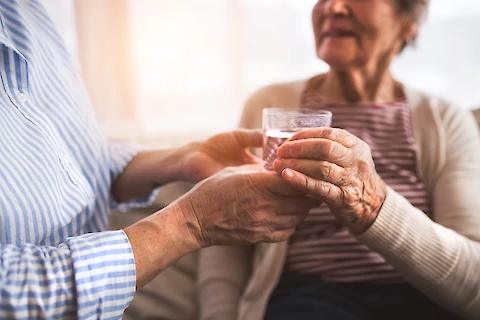
Our bodies' ability to manage water balance changes as we age, making the elderly population more susceptible to dehydration. Our team at Senior Helpers Berkeley will look into the importance of hydration and the risks of dehydration in seniors, and provide tips for incorporating more fluids into their daily routines.
How Important Is Hydration for Seniors?
Water plays a vital role in essential body processes, from regulating temperature to aiding digestion, and lubricating joints. With aging, the body's ability to conserve water reduces and the sense of thirst diminishes, making seniors particularly prone to dehydration.
Staying hydrated helps the body function optimally, boosts energy, aids digestion, and prevents constipation - all of which are important for seniors' overall well-being.
The Risks of Dehydration in Seniors
Dehydration occurs when the body loses more fluids than it takes in. This disrupts the balance of minerals like sodium and potassium which are pivotal for the body's functionality. Symptoms can include increased thirst and dry mouth, to more severe ones, which include dizziness, rapid heartbeat, and unconsciousness. In seniors, chronic dehydration could lead to grave complications such as urinary tract infections, kidney stones, and falls owing to dizziness or fainting.
Recommended Daily Water Intake for Seniors
While the "8 glasses a day" rule may work as a general guideline, seniors' hydration needs will not be the same as those of young adults. Factors such as medications, medical conditions, climate, and physical activity level can affect these needs.
Health experts generally agree that seniors should aim for about 1.7 liters (nearly 6-7 glasses) of water daily. This can be adjusted depending on the factors discussed above and under the guidance of a healthcare professional.
Practical Hydration Tips for Seniors
To prevent dehydration, seniors and their caregivers must devise strategies to increase fluid intake. This may involve setting reminders to drink water throughout the day or using a water bottle with measurements to track the intake.
Aside from water, other fluids such as milk, juice, and hydrating foods like fruits, vegetables, and soups can help meet hydration needs. For caregivers, being attentive to signs of dehydration and encouraging fluid intake, especially during meals, are key roles to play. Ask seniors how they feel about drinking more water and ensure they always have a bottle close by to quench their thirst.
Contact Senior Helpers for Personalized Care Services
Senior hydration is far too important to overlook, with sound hydration practices potentially enhancing seniors' health and quality of life. The risk of dehydration increases with age, making it vital for seniors and caregivers alike to understand its importance, recognize its symptoms, and take proactive measures to prevent it.
If you are in Berkeley, Oakland, Alameda County, Vallejo, and neighboring regions, consider Senior Helpers Berkeley for your in-home care needs. Contact us to learn more about our senior care services!